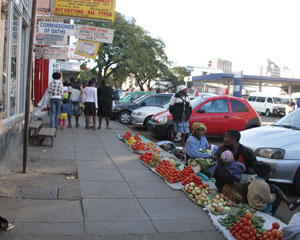
ZIMBABWEANS have been hopping from one business venture to another in a bid to survive under the prevailing tough economic conditions which have seen many company closures.
BY TARISAI MANDIZHA
Experts say 95% of the country’s labour force is now in the informal sector, a point alluded to by Finance minister Patrick Chinamasa in his 2014 national budget when he said the old economy was dead and a new one — based on the informal sector — had been born. He was urging financial institutions to support small-to-medium enterprises.
The latest popular business to hit Zimbabwe by storm is quail bird farming, which has changed the lives of many. Quail breeder Paul Munyuki told Standardbusiness on Friday that there was a huge demand for quail meat and eggs on the market due to few suppliers.
Munyuki ventured into this line of business a year ago and currently breeds 400 birds for eggs which he sells at $6 per crate. He, however, sometimes hatches the eggs to get chicks which he sells at two weeks old at $2 each.
“The demand is overwhelming; there is a huge demand for the birds and many people are looking at expanding their projects. Our customers have to book for the kits because they are not always available and at times they book between three to six weeks in advance,” Munyuki said.
He said prior to this, he had been and still is into broiler and layer production.
“The reason why I got into this line of business is because there is cash in it, and I grew up in a farming family and have always enjoyed being around animals. My wife and I do chicken eggs as well as the quail pilot project. I also make and supply quail cages, mostly for those who would have bought quail birds from us,” he said.
- Chamisa under fire over US$120K donation
- Mavhunga puts DeMbare into Chibuku quarterfinals
- Pension funds bet on Cabora Bassa oilfields
- Councils defy govt fire tender directive
Keep Reading
Before the quail business, sack potato farming was a hit but it fizzled out as the seemingly lucrative business did not deliver good returns. Many households grew potatoes in sacks in what many joked could have been in sync with President Robert Mugabe’s calls for Zimbabweans to eat potatoes if they ran out of their staple, mealie-meal.
In a 2005 interview with Associated Press, Mugabe said although there was shortage of maize, it did not mean that there was no food in the country.
“We have heaps of potatoes but people are not potato eaters … they have rice but they’re not as attracted [to that].”
The tough economic environment has meant that Zimbabweans have to search for survival strategies. Each day people come up with various ideas for survival.
Cross-border trading at one time became the in-thing, with Zimbabweans eking a living from selling doilies and handicrafts in South Africa and Mozambique. It later turned into food stuffs, with traders selling maputi (roasted corn), especially in South Africa.
The sale of second-hand clothing (commonly referred to as mabhero) has stood the test of time despite a ban imposed by government last year to protect the local textile industry. This has become the most popular business in town during the evenings.
Street vendors and municipal authorities fight running battles but this has not stopped the business.
Buy Zimbabwe economist Kipson Gundani said the current trend where people hop from one business interest to another was an indication that the economy was not breeding new opportunities.
As a result, people jostle for every opportunity that comes along.
“This also shows Zimbabweans are not natural entrepreneurs, because an entrepreneur is someone who is able to come up with an idea and practically build something out of it; but if you see people rushing from one initiative to another, it means we don’t have the right ideas.”











